The Vedic Shanti Mantras have long been chanted for inner peace, material gains, and even for the attainment of spiritual goals. The Dasha Shanti Mantra lyrics and their meanings have had their place in the four Vedas (Rig Veda, Sama Veda, Atharva Veda, and Yajur Veda), and also appear in various Upanishads, which further goes to show their importance in Hindu religious practices.
Often chanted before and after spiritual classes, satsangs, or religious ceremonies, they aid practitioners in developing qualities of inner peace, tranquility, self-awareness, and intuitive knowledge, while keeping negative thoughts at bay. Chanting them with a perfect understanding of the lyrics and meanings are said to increase their effects and potency manifold for practitioners.
Also referred to as Shanti Path in the Upanishads, the mantras are ended by chanting ‘ Om Shaantih Shaantih Shaantih’ to remove any and all obstacles arising from the three realms, namely the environmental (Adhibautika), Obstacles from divine like natural calamities (Adhidaivika), and internal obstacles arising from our own mind and body (Adhyatmika).
In this article, we dive deep into the heart of these centuries-old vedic mantras to further build on their understanding.
Shanti Mantra Lyrics With Their Meanings & Description
Here is the list of the most popular and important Dasha Shanti Mantras

1) Om Sham No Mitrah
2) Om Saha Nāvavatu
3) Om Yaśchandasāmṛṣabho Viśvarūpaḥ
4) Om Aham Vrikshasya
5) Om Purnamada Purnamidam
6) Om Apyayantu Mamangani
7) Om Van Me Manasi Pratistiha
8) Om Bhadrram Vo Api
9) Om Bhadram Karnebi
10) Om Yo Brahmanam Vidadati Purnam
Please find each of the Shanti Mantras below, with their lyrics, meanings, and benefits.
1. Oṃ Sham No Mitrah Sham
This mantra first appears in the Yajur Veda, and later on in the Taittiriya Upanishad, Sikshavalli. With the regular chanting of this mantra, the seeker / disciple is asking for healthy body and mind for Jnana Yogyata Prapthi, so as to receive and assimilated the knowledge without any hindrances
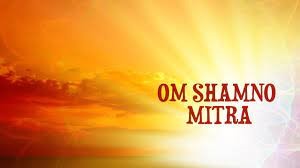
Shanti Mantra Lyrics
Om Sham No Mitrah Sham Varunnah | Sham No Bhavatv-Aryamaa | Sham No Indro Brhaspatih | Sham No Vissnnur-Urukramah | Namo Brahmanne | Namaste Vaayo | Tvam-[e]Iva Pratyakssam Brahmaasi |Tvaam-[e]Iva Pratyakssam Brahma Vadissyaami | Rrtam Vadissyaami | Satyam Vadissyaami | Tan[d]-Maam-Avatu | Tad-Vaktaaram-Avatu |Avatu Maam | Avatu Vaktaaram || Om Shaantih Shaantih Shaantih ||
Shanti Mantra Meaning
By chanting this mantra, practitioners are essentially invoking the seven presiding organ devatas in their body for Jnana Yogyata Prapthi. We invoke all deities to keep us healthy.
We invoke Mitra and Varuna devatas, who preside over inhalation and exhalation, and ask them for unobstructed breathing.
By invoking Aryaman, which is another name for Surya devata, the presiding deity of eyesight, we are praying for the health and good condition of our eyes.
Indra devata presides over our hands, and we pray to him for their strength and wellbeing to carry on our duties while we work towards knowledge.
Brhaspati represents communication and intelligence, and by invoking we pray for a better ability to understand and assimilate the knowledge.
Viṣṇuḥurukramaḥ refers to Vishnu, who is the lord of the feet, and thus helps us in movement, as well as aiding us to sit still in one location.
Brahma is Hiranyagarbha, a subtle aspect of the body that is not visible, and represents Samasti Prana or Vayu, and Samasti Sukshma Shariram or Universal Mind, and its connection to our mind.
Vayu or Samasti Prana refers to the air that we breathe and is experienced by our nostrils, and being perceptible, it is also a Pratyaksha devata, while the concept of the Universal mind is a Paroksha devata.
We then pray that all these seven devatas be a source of strength and auspiciousness to us, and offer Namaskaram to these devatas.
Rrtam Vadissyaami refers to living the right way, and with the right action, and and Satyam Vadissyaami means living with the right knowledge. This we pray to the Hiranyagarbha or Samasti Prana Tatvam, which is the embodiment of right knowledge and action.
Tan[d]-Maam-Avatu | Tad-Vaktaaram-Avatu – May lord protect me so that I can study without any obstacles, and protect my Guru also.
Towards the end we chant ‘Shanti’ three times, aimed at the three-fold obstacles as discussed above, Adhyatmika (from within), Adhibautika (environmental), and Adhidaivika (natural).
2. Oṃ Saha Nāvavatu
Belonging to the Krsnayajurveda, this Shanti Mantra makes its appearance in the Taittiriya, Katha, and Shvetashvatara Upanishads.
Shanti Mantra Lyrics
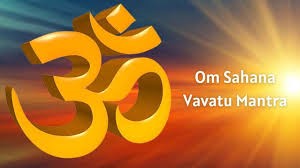
oṁ saha nāvavatu । saha nau bhunaktu । saha vīryaṁ karavāvahai ।
tejasvi nāvadhītamastu mā vidviṣāvahai । oṁ śāntiḥ śāntiḥ śāntiḥ ॥
Shanti Mantra Meaning
In this mantra we are asking the lord to protect and nourish both us and our guru, so that we can gain the fruit of knowledge. We ask that both of us make the effort to ensure the transfer of knowledge takes place smoothly.
We ask that the knowledge we gain be perfectly clear, without any misunderstanding, and remain fresh in our minds forever.
We also pray that there not be any obstacles during the sharing and receiving of knowledge, whether it is our internal body or Adhyatmika, environmental or Adhibhautika, and natural calamities or Adhidaivika.
Basically, the spiritual student is praying to the lord and seeking five factors that are extremely important.
1) Guru Shishya putting appropriate effort (Prayatna) in sharing and receiving the knowledge
2) Assimilation, and retention (Medha Shakthi) of the knowledge
3) Guru Shisya’s long term healthy relationship
4) Guru sharing the right knowledge (Jnanam)
5) As a result of Knowledge (Jnana Palam) student obtaining the Samatvam status
3. Om Yaśchandasāmṛṣabho Viśvarūpaḥ
This mantra belongs to Krsnayajurveda, and appears in Taittiriya Upanishad, Sikshavalli, 4th Anuvaka.
Shanti Mantra Lyrics
Om yaśchandasāmṛṣabho viśvarūpaḥ |
chandobhyo’dhyamṛtātsaṁbabhūva |
sa mendro medhayā spṛṇotu |
amṛtasya deva dhāraṇo bhūyāsam |
śarīraṁ me vicarṣaṇam | jihvā me madhumattamā |
karṇābhyāṁ bhūri viśruvam |
brahmaṇaḥ kośo’si medhayā pihitaḥ |
śrutaṁ me gopāya |Om Shaantih Shaantih Shaantih ||
Shanti Mantra Meaning
In this mantra, a prayer is offered to the formless, limitless Brahman, who is visualised in the form of Omkara symbol. We pray to that Lord (Omkāra) to strengthen our intellectual vigour, to possess the immortal wisdom.
We pray that our body be fit and healthy, and speech sweet and agreeable to all. We also pray that we listen to the scriptures repeatedly through our ears to help preserve our learnings.
4. Om Aham Vrikshasya
This again belongs to the Krsnayajurveda, and appears in the Taittiriya Upanishad, Sikshavalli, 10th Anuvaka. It is quoted by the great Brahma Jnani, Trisanku Rishi on gaining self-knowledge and wisdom.
In this mantra, the great rishi states that he enlivens and supports the whole creation, and that he is as great as Isvara, having Isvara Saksi, and all the glories of Isvara.
Following this, he states that he has received the greatest wealth in the world, which is Brahma Jnanam.
Shanti Mantra Lyrics
Om ahaṁ vṛkṣasya rerivā | kīrtiḥ pṛṣṭhaṁ gireriva |
ūrdhvapavitro vājinīva svamṛtamasmi | draviṇaɱ savarcasam |
sumedha amṛtokṣitaḥ | iti triśaṅkorvedānuvacanam ||
Om śāntiḥ śāntiḥ śāntiḥ ||
Shanti Mantra Meaning
Om ahaṁ vṛkṣasya rerivā – I am the very adhistanam of universal tree, I lend my existence to support the universe, without my support the universe cannot exist.
kīrtiḥ pṛṣṭhaṁ gireriva – I have all the glories of the universe and my fame is as high as the peak of a mountain.
ūrdhvapavitro vājinīva svamṛtamasmi – I am the purest of the pure and I am eternal like the Sun
draviṇaɱ savarcasam – I have this greatest wealth, which is brilliant, it has removed my darkness of ignorance
sumedha amṛtokṣitaḥ – I am the omniscient Brahman, I illuminate every mind and I know everything through all the minds. All knowledge belongs to me alone. I am eternal free from decay and death. I am soaked in this immortal, eternal wisdom.
iti triśaṅkorvedānuvacanam – This is declared by Brahma Rishi Triśaṅku after gaining the self-knowledge and wisdom
5. Om Pūrṇamadaḥ Purnamidam
This sloka belongs to the Shukla Yajurveda, it also appears in the Brihadaranyaka Upanishad V.1, and the Ishavasya Upanishad 1.1.
It indicates the relationship between the soul of an individual to the divine Supreme Spirit.
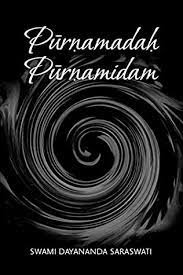
Shanti Mantra Lyrics
Om pūrṇamadaḥ pūrṇamidaṁ pūrṇātpurṇamudacyate
pūrṇaśya pūrṇamādāya pūrṇamevāvaśiṣyate ||
Om śāntiḥ śāntiḥ śāntiḥ ||
Shanti Mantra Meaning
Om purṇamadaḥ purṇamidam – This is about Jivatma Paramatma aikyam.
In Vedanta Sastra ‘Adah’ corresponds to the Paramatma, the unmanifest Brahman who is the infinite divine consciousness. ‘Idam’ is the Jivatma which is also the infinite divine consciousness.
If Paramatma is purnam and infinite, Jivatma is also infinite, and equating them together, we can say that Jivatma and Paramatma are one and the same, both being infinite. This is from the standpoint of their original nature.
purṇatpurṇamudacyate – From the purṇa-svarupa paramatma the purṇa svarupa jivatma originates or emerges, this is from the standpoint of nama and rupa.
purṇasya purṇamadaya – Adaya means separated, when the purṇa-svarupam of Jivaatma and purṇa swaroopam of paramatma are separated.
purṇamevavasiṣyate – purṇa-svarupam alone remains
This santi patha conveys three main messages.
- Jivatma and Paramatma are essentially one and the same.
- Jivatma and Paramatma have got cause-effect relationship superficially in the form of nama roopa, but essentially, no relationship.
- Other than the essential nature (Consciousness / Brahman) of Jivatma and Paramatma, no anatma exists independently, which means all nama roopa is Mitya.
Therefore, the essence is ‘Brahma Satyam, Jagan Mitya, Jivobrahmaivanaparaḥ’ is brought out from this Shanti Patha. This shloka always reminds the seeker that the entire universe is always filled with Brahman.
6. Om Apyayantu Mamangani
This Santi Path belongs to the Samaveda, and appears in the Kenopanishad 1.1, and Chandogya Upanishad 1.1.
Shanti Mantra Lyrics
Om āpyāyantu mamāṅgāni vākprāṇaśckṣuḥ
śrotramatho balamindriyāṇi ca sarvāṇi |
sarvaṁ brahmaupaniṣadaṁ māhaṁ brahma nirākuryāṁ mā mā brahma
nirākarodanikāraṇamastvanikāraṇaṁ me’stu |
tadātmani nirate ya upaniṣatsu dharmāste
mayi santu te mayi santu ||
|| Om śāntiḥ śāntiḥ śāntiḥ ||
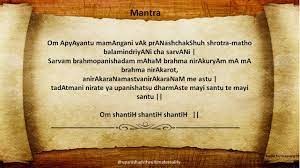
Shanti Mantra Meaning
Let all my organs and senses, including limbs, speech, prana, eyes, and ears be healthy, grow strong, and be fully developed.
The Upanishads reveal that everything is Brahman, so let me not deny this, and let Brahman never disown me.
Let Brahman not reject me, and let me also not reject Brahman. Since I am engaged in pursuit of the self, help me acquire all qualities mentioned as qualifications in the Upanishads. Om! Peace! Peace! Peace!
7. Om Van Me Manasi Pratisthita
This Shanti Mantra belongs to Rig Veda and appears in Aitareya Upanishad
Shanti Mantra Lyrics
Om vāṅ me manasi pratiṣṭhitā | mano me vāci pratiṣṭhitam |
āvirāvirma edhi | vedasya ma āṇīsthaḥ | śrutaṁ me mā prahāsīḥ anenādhītenāhorātrānsandadhāmi | ṛtaṁ vadiṣyāmi |
satyaṁ vadiṣyāmi | tanmāmavatu | tadvaktāramavatu |
avatu mām | avatu vaktārāmavatu vaktāram || Om śāntiḥ śāntiḥ śāntiḥ ||
Shanti Mantra Meaning
Let my speech and mind function together in harmony, let the knowledge of the self reveal itself, and grow inside me. Let my mind and speech support, and help me understand the truth taught by the Vedic teachings.
Let me be persistent in learning Vedic scriptures day and night, and let me not forget the knowledge gained. I will speak about the divine truth, I speak about the absolute truth, and may that truth protect me and my teacher, Om Peace! Peace! Peace.
8. Om Bhadram No Apivataya Manah
This Shanti Mantra belongs to Rig Veda.
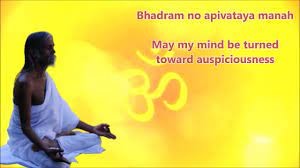
Shanti Mantra Lyrics
Om Bhadrram no apivataya manah |
Om Shanti Shanti Shanti !
Shanti Mantra Meaning
This prayer essentially asks the lord to take our mind to the auspicious Brahman, helping us in gaining Brahma Jnanam.
9. Oṃ Bhadraṃ Karṇebhiḥ
This mantra belongs to Atharvaveda and appears in Mundaka, Māndukya and Prashna Upanishads.
Shanti Mantra Lyrics
Om bhadraṁ karṇebhiḥ śṛṇuyāma devāḥ |
bhadraṁ paśyemākṣabhiryajatrāḥ |
sthirairaṅgaistuṣṭuvāgaɱsastanūbhiḥ |
vyaśema devahitaṁ yadāyūḥ |
svasti na indro vṛddhaśravāḥ |
svasti naḥ pūṣā viśvavedāḥ |
svasti nastākṣaryo ariṣṭanemiḥ |
svasti no vṛhaspatirdadhātu ||
Om śāntiḥ śāntiḥ śāntiḥ ||
Shanti Mantra Meaning
Om! bhadram kaṛnēbih śṛṇuyāma devāḥ – During interactions, we pray that we always listen to auspicious, pleasing, and meaningful things through our ears, and may all behave with us in a pleasing manner. In a spiritual context, this means ‘let me hear of Brahman through my ears always.’
bhadraṁ paśyemākṣabhiryajatrāḥ – Let me see only Mangalam that gives anandah through my eyes, spiritually let me see Brahman in everything and everywhere.
sthirairaṅgaistuṣṭuvāgaɱsastanūbhiḥ – Let us admire and appreciate the glory of God or Brahman always with our healthy limbs.
vyaśema devahitaṁ yadāyūḥ – May we enjoy our complete lives allotted by glorifying the Lord with Vedic mantras doing Isvara aradhanam.
svasti na indro vṛddhaśravāḥ – May Lord Indra of great glory bless me with an auspicious spiritual journey and make me a glorious Jnani.
svasti naḥ pūṣā viśvavedāḥ – Surya Bhagavan who is omniscient bless me by giving spiritual knowledge.
svasti nastākṣaryo ariṣṭanemih – May Garuda devata, who is the vehicle of Lord Vishnu, bless me with unobstructed movement without any obstacle in my spiritual journey.
svasti no vṛhaspatirdadhātu – May Brihaspati, who is the Lord of wisdom, bless me with the intelligence to absorb the teaching.
Om śāntiḥ śāntiḥ śāntiḥ – Let there be no adhyatmika (internal), adhibhautika (external) and adhidaivika (from nature) obstacles in this spiritual pursuit.
10. Om Yo Brahmanam Vidadati Purnam
This mantra is in praise of Guru Shri Dakshinamurti, who is an incarnation of Lord Shiva. This mantra is about his glorious powers and teachings which transforms even an ordinary person into a great Sadhaka.
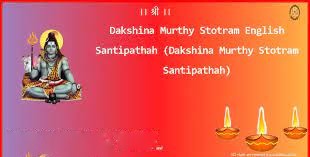
This Shanti Path belongs to the Yajurveda and appears in Svetasvatara Upanishad.
Shanti Mantra Lyrics
oṁ yo brahmāṇaṁ vidadhāti pūrvaṁ,
yo vai vedāṁś-ca prahiṇoti tasmai |
taṁ ha devam ātmabuddhi-prakāśaṁ
mumukṣur-vai śaraṇam ahaṁ prapadye|
Om śāntiḥ śāntiḥ śāntiḥ |
Shanti Mantra Meaning
The meaning is – I, the seeker of the knowledge of liberation, completely surrender myself to Lord, who projected Brahmaji or Hiranyagarbha at the beginning of the creation and who radiates the knowledge in the form of Vedas to enlighten and to establish the ‘Truth’ in me.
I take refuge in Him with complete faith and belief so that my intellect shines with Self-knowledge. Om peace, peace, peace!
Conclusion
The Dasha Shanti Mantras are beautiful prayers that can drive transformative changes in the lives and practices of a practitioner with their regular chanting and invocations. Having a clear understanding of the lyrics, along with its meaning can further enhance their power, making their effects all the more discernible in spiritual practices.
These mantras, when chanted regularly, can help practitioners attain inner and outer peace, attain material, and spiritual progress, while keeping surroundings blissful and peaceful at all times. They also aid in removing or overcoming obstacles that may arise on the spiritual path, while also aiding with the purification of the mind to better receive and assimilate Vedantic teachings.
Om śāntiḥ śāntiḥ śāntiḥ ||
- The Namagiri Thayar Mantra – For Wisdom, Creativity & Prosperity - April 29, 2024
- Krishnashtakam – “Krishnam Vande Jagadgurum” – Lyrics & Meaning - April 4, 2024
- Karadarshanam – “Karagre Vasate Lakshmi” – Meaning & Benefits - March 26, 2024

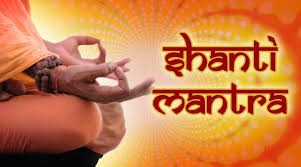
Excellent exposition. Clear explanations. My sincere gratitude for ksking it available to ignorant aspirants like me. May You be blessed with all that you want to be blessed with.
Namasthe.. So nice.. Thank you so much for imparting this knowledge.. May GOD bless you!